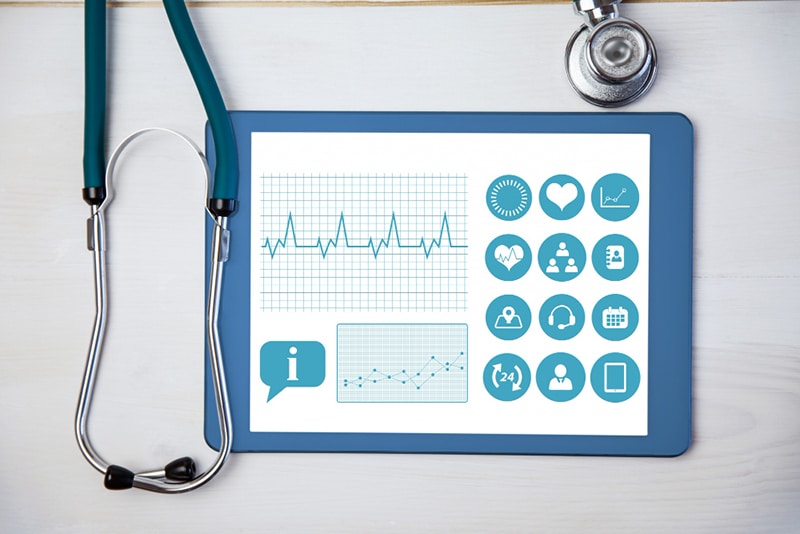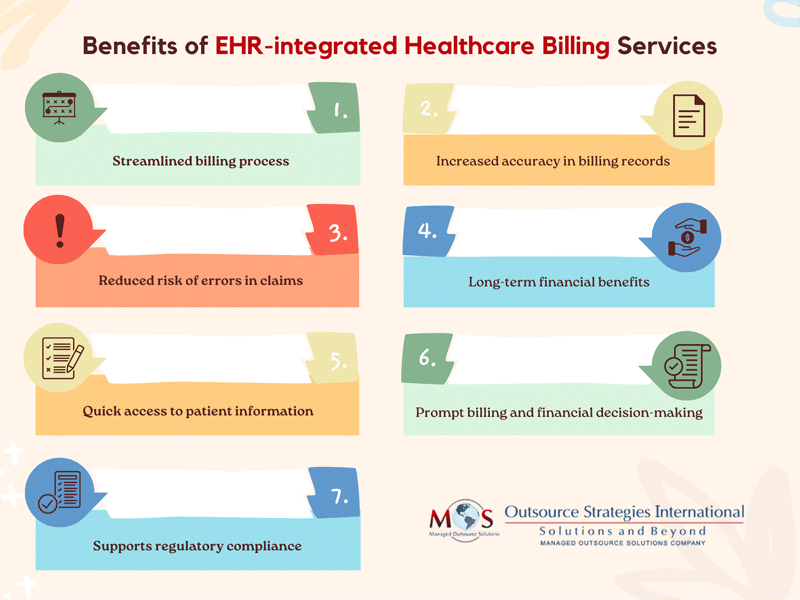The introduction of technology in medical billing has revolutionized the medical billing process. Electronic Health Records (EHR) offer a streamlined approach for companies providing medical billing services, significantly reducing paperwork hassles. EHRs enable physicians to maintain accurate and complete clinical documentation, which is essential successful medical billing and coding. EHR software also benefits patients and practice staff by minimizing form-filling and speeds up referrals and prescription processes, optimizing operational flow.


Questions about optimizing software for billing? Explore our medical billing services for streamlined efficiency.
Contact us at (800) 670-2809
EHR implementation streamlines patient data storage, enabling healthcare professionals to access comprehensive and up-to-date medical histories, medications, test results, and treatment plans in a centralized electronic format. These systems also contribute to better communication and collaboration among different departments within a medical practice, leading to more efficient workflows, reduced paperwork, and enhanced patient engagement. The integration of EHRs also supports data-driven decision-making, quality improvement initiatives, and compliance with regulatory standards, ultimately elevating the overall efficiency, effectiveness, and quality of healthcare delivery.
Advantages of EHR Integration in Medical Billing
Integrating Electronic Health Records (EHR) into medical billing processes offers several impactful benefits, including streamlining healthcare operations and improving overall efficiency. Let us explain in detail:
Reduced paperwork: EHR integration in healthcare coding and billing also significantly reduces paperwork by automating the documentation and information-sharing processes. Through seamless integration, patient data, treatment details, and billing information are electronically recorded and shared across systems, eliminating the need for manual paperwork, reducing errors, and improving overall efficiency in healthcare administration.
Improved accuracy and reduced errors: EHR integration helps eliminate manual data entry errors, as information flows seamlessly from patient records to billing systems. This reduces the risk of mistakes in coding, patient identification, and billing details. With real-time data entry and validation, errors related to illegible handwriting or manual mistakes are minimized. Integration of digital systems also incorporates built-in checks and alerts, ensuring that billing codes adhere to industry standards and compliance regulations. Additionally, the automated verification of patient information, insurance details, and coding reduces the chances of mistakes, leading to a more precise and error-resistant process.
Enhanced efficiency: With proper integration, healthcare providers can streamline data entry, eliminate duplicate entries, and reduce manual errors. The automation of coding and medical billing processes accelerates the overall workflow, enabling faster claim submissions and reducing reimbursement delays. Real-time access to patient records, insurance information, and treatment details facilitates quicker decision-making, while built-in checks and alerts ensure compliance with coding standards. Overall, EHR integration optimizes efficiency by simplifying tasks, minimizing redundancies, and promoting a more streamlined and accurate medical billing workflow.
Real-time access to patient information: This integration allows healthcare providers to instantly retrieve and update patient data, including demographics, medical history, and insurance details. Real-time access enables billing staff to verify patient information promptly, reducing errors and ensuring accurate claims. It also facilitates quick responses to changes in patient records, insurance coverage, or treatment plans, promoting efficient and accurate billing processes.
Accurate coding and compliance: EHRs often include built-in coding assistance tools, such as code suggestions and alerts for potential coding issues, ensuring adherence to regulatory requirements and compliance standards. By linking clinical documentation with billing codes, EHR integration enhances accuracy, reduces the likelihood of coding discrepancies, and helps healthcare providers maintain compliance with industry regulations.
Reduced administrative costs: Automation of billing processes reduces the need for manual intervention, leading to lower administrative costs. Integrated systems eliminate the need for manual data entry, reduce paperwork, and minimize the risk of errors associated with traditional paper-based processes. Automated appointment scheduling, claims processing, and billing workflows lead to increased operational efficiency, saving time and resources. By centralizing patient information and administrative functions in a digital platform, the EHR system helps healthcare organizations optimize their processes, ultimately lowering administrative overhead and improving overall cost-effectiveness.
3 EHR Challenges for Billing Professionals & Solutions
Healthcare billing professionals may face certain challenges when working with EHRs. Here are three significant challenges:
- Complexity of EHR systems: EHR systems can be highly complex, featuring a wide array of functionalities beyond simple billing. Navigating through intricate interfaces and understanding the full scope of the EHR system can be challenging for billing professionals who may primarily focus on financial aspects. Training and ongoing support are crucial to help billing staff effectively utilize EHR features without hindering their primary responsibilities.
- Interoperability issues: Many healthcare organizations use different EHR systems, and achieving seamless interoperability between these systems can be a major challenge. Billing professionals may encounter difficulties in obtaining comprehensive patient information when EHRs don’t effectively communicate with each other. Interoperability challenges can lead to data fragmentation and hinder the efficiency of medical billing processes. These challenges can be addressed by adopting standardized data formats (HL7, FIHR or Fast Healthcare Interoperability Resources) and APIs (Application Programming Interfaces). These will enable systems to communicate and share data, thereby promoting interoperability among various healthcare applications.
- Compliance and regulatory changes: Keeping up with the constantly evolving healthcare regulations and compliance requirements is a significant challenge for documentation professionals using EHR systems. Changes in coding standards, billing regulations, and documentation requirements can impact the accuracy of claims. Adapting to these changes in a timely manner and ensuring that the EHR system is configured to meet new compliance standards can be demanding for billing staff.
Staying up to date with evolving regulations, collaborating with legal and compliance experts to interpret regulatory changes and assess their implications, conducting a thorough compliance assessment of the EHR system, building flexibility into the EHR system’s architecture to accommodate future regulatory changes without major system redesigns, thorough testing of the EHR system to verify compliance, regularly auditing and validating the EHR system to ensure ongoing compliance are some of the effective ways to address this challenge.
Overall, successful EHR implementation and maintenance requires a combination of proper training, ongoing education, and technology solutions designed to simplify billing processes within the context of EHR systems.


Need more information on maximizing software capabilities in billing?
Contact us now or Talk to us (800) 670-2809!





